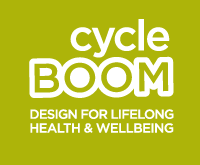In April cycle BOOM hosted a British Society for Gerontology sponsored seminar Design for Wellbeing: Innovative research methods for understanding older people’s everyday mobility at Oxford Brookes which was attended by around 50 people. The seminar brought together the seven projects funded under the UK Research Councils’ Lifelong Health and Wellbeing (LLHW) ageing research programme. The aim was to report and discuss the novel methodologies that are being used by the projects in order to generate ‘ambitious and transformative research’ that seeks to improve design for mobility and the wellbeing of the ageing population.
Charles Musselwhite, Associate Professor in Gerontology at the Centre for Innovative Ageing (CIA) at Swansea University, kicked off the day mapping out how post-modernist approaches from critical gerontology (e.g. cultural geography and sociology) are increasingly providing a different lens through which to understand older mobility. This has allowed the development of new and different understanding of older mobility and to take account of other ways we can be mobile e.g. potential, virtual and imaginative mobilities. Perhaps controversially, Charles also suggested that lack of literal mobility may not necessarily be a problem and argued that mobility is multifaceted and requires more diversity and depth of research (i.e. inter/multi/trans disciplinary approaches).
The remainder of the morning included overviews from the seven projects. Ben Spencer and I explained the value of a mixed methods approach in understanding older cycling mobility for the cycle BOOM project and provided examples of our micro-ethnographic velo-mobile observational approach with older cycle users. Dr Helen Jarvis (Newcastle) demonstrated how the MyPlace project is utilising a participatory platform and methodology to support citizen-led engagement in the design of age-friendly urban environments. Professor Vicki Hanson (Dundee) in discussing the BESiDE project, which aims to address how the built environment can facilitate physical activity and wellbeing in care homes, drew parallels with the methods and the methods they are adopting and the methods used by web designers in computing – “Nothing beats working with users!” Professor Rose Gilroy (Newcastle) of the Co-Motion project provided a thoughtful account of the ethical and methodological challenges of doing qualitative longitudinal research with older people. Discussing the need to move beyond the procedural, she called for deeper reflexivity about engagement with participants particularly when dealing with sensitive issues, and to also think about the self, “your life is not hermetically sealed, parts of your life leak out into the research and the research back into your life.” Dr Jenny Mindell (UCL) of the Street Mobility and Network Accessibility project described how her team are developing a community severance index through questionnaire surveys of residents’ perceptions. By combining measures of physical layout of streets and traffic flow and conducting stated preference surveys they are estimating the impact community severance has on wellbeing. Katherine Brookfield, Sara Tilley and Catherine Tisch (Edinburgh) covered the three key strands of the Mobility, Mood and Place project. This involves designers in training working with older people to design better living environments; mobile ethnography and measuring mood whilst walking using EEG (electroencephalography); and archival research to integrate longitudinal environmental measures with cohort data of Lothian Birth Cohort 1936. Professor Sarah Wigglesworth (Sheffield) rounded off the morning explaining how the dwell project is focusing on process of design planning using participatory engagement sessions with user groups in Sheffield with the aim of improving the design of housing for older people.
The afternoon workshops focused on two separate themes: participatory approaches to mobility and design, and, measuring wellbeing. Issues discussed in the former workshop centred around the nature of participation and how it should differ from consultation (i.e. ‘co-producing knowledge’ rather than ‘gathering information’); the challenges of participatory approaches such as participant self-selection and how to involve hard to reach groups; the difficulty in finding creative spaces of engagement; and the need to be attuned to local context and obtain trust and ensure that participants feel part of a process of change. There was agreement that all of this required sensitivity and possibly training for researchers.
The wellbeing workshop focused around what is understood by wellbeing and how this nebulous concept can mean quite different things to different people. There were discussions around whether and how it can be measured, whether we should measure it and what other non-numerical approaches might be more beneficial in understanding what it means to different people, in different contexts and at different moments in time.
Just as the day had opened it closed with some reflections by Charles Musselwhite. Charles was appreciative of what he described as the ‘innovative and creative methodologies’ that are being used across the projects and was pleased to see that people are at the heart of them. In closing, he reminded us of the challenge to convince policy makers of the need to move beyond a focus on economic capital to appreciate the importance of social capital that the findings from the projects could promote.
Feedback on the event from participants was very positive and there were calls for a further event where the projects can report on the challenges of data analysis and present preliminary findings. Judging by the ringing endorsement it seem that cycle BOOM could well be hosting a follow-up event at Oxford Brookes in the future. Watch this space!
We would like to thank the British Society for Gerontology and the Research Councils UK for supporting this event.
![]() A Twitter feed from the event can be found at #resoldermobility
A Twitter feed from the event can be found at #resoldermobility
Click on the logos below for videos of the speakers presenting the work of each of the seven Design for Wellbeing projects.
Charles Musselwhite (Swansea University) – Keynote
Tim Jones/Ben Spencer (Oxford Brookes University) – cycle BOOM
Helen Jarvis (Newcastle University) – MyPlace
Vicki Hansen (University of Dundee) – BESiDE
Rose Gilroy (Newcastle University) – Co-Motion
Jennifer Mindell (UCL) – Street Mobility and Network Accessibility
Katherine Brookfield, Sara Tilley and Catherine Tisch (Edinburgh University) – Mobility Mood and Place
Sarah Wigglesworth (University of Sheffield) – dwell













Leave a Reply